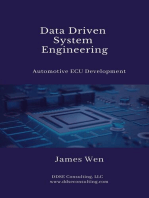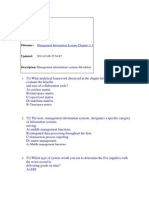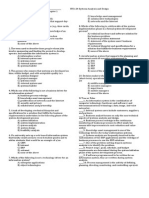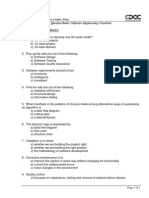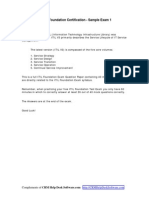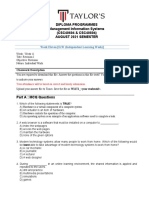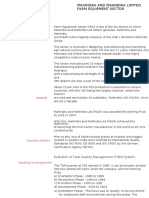System Analysis and Design MC and TF Questions
System Analysis and Design MC and TF Questions
Uploaded by
Enges FormulaCopyright:
Available Formats
System Analysis and Design MC and TF Questions
System Analysis and Design MC and TF Questions
Uploaded by
Enges FormulaOriginal Description:
Copyright
Available Formats
Share this document
Did you find this document useful?
Is this content inappropriate?
Copyright:
Available Formats
System Analysis and Design MC and TF Questions
System Analysis and Design MC and TF Questions
Uploaded by
Enges FormulaCopyright:
Available Formats
Management information systems (MIS) A) create and share documents that support day-today office activities
process business transactions (e.g., time cards, payments, orders, B) etc.) C) capture and reproduce the knowledge of an expert problem solver
use the transaction data to produce information needed by managers D)to run the business none of the above
E)
The term used to describe those people whose jobs involve sponsoring and funding the project to develop, operate, and maintain the information system is A) B) C) information worker internal system user systems owner
D)external system user systems builder
E)
The person who ensures that systems are developed on time, within budget, and with acceptable quality is a A) B) C) systems designer project manager systems owner
D)external system user systems builder
E)
4 CT
Which one of the following is not a business driver for an information
system? A) B) C) business process redesign knowledge asset management proliferation of networks and the Internet
D)security and privacy collaboration and partnership
E)
A task of developing a technical blueprint and specifications for a solution that fulfills the business requirements is undertaken in the following phase of the system development process A) B) C) system initiation system implementation system analysis
D)system design feasibility analysis
E)
If a university sets up a web-based information system that faculty could access to record student grades and to advise students, that would be an example of a/an A) B) C) CRM intranet ERP
D)extranet none of the above
E)
Which of the following is not a technology driver for an information system? A) enterprise applications
B) C)
object technologies knowledge asset management
D)collaborative technologies networks and the Internet
E)
Which of the following is a deliverable of the system implementation phase in a formal system development process? A) B) C) technical hardware and software solution for the business problem business problem statement statement of the system users business requirements
technical blueprint and specifications for a solution that fulfills the D)business requirements none of the above
E)
An information system that supports the planning and assessment needs of executive management is A) B) C) DSS TPS ERP
D)MIS none of the above
E)
10
Decision makers who are concerned with tactical (short-term) operational problems and decision making are A) B) C) middle managers executive managers supervisors
D)mobile managers none of the above
E)
Your Results:
The correct answer for each question is indicated by a .
1 INCORRECT
An information system is the combination of computer technology (hardware and software) and telecommunications technology (data, image, and voice networks). A) B) True False
2 INCORRECT
Internal system users include customers, suppliers, and partners. A) B) True False
3 CORRECT
Business analyst focuses on only the non-technical aspects of systems analysis and design. A) B) True False
4 CORRECT
Business process redesign is the continuous monitoring of business processes to effect small, but measurable improvements in cost reduction and value-added. A) True
False B) Feedback: Business process redesign (BPR) is the study, analysis and redesign of fundamental business processes to reduce costs and/or improve value-added to the business.
5 CORRECT
Knowledge asset management is one of the technology drivers for todays information systems. A) True
False B) Feedback: Knowledge asset management is one of the business drivers for todays information systems.
6 CORRECT
Systems analysts are frequently involved in the customization of the ERP applications and the redesign of business processes to use the ERP solutions. A) B) True False
7 INCORRECT
One of the problem-solving steps in systems analysis is to identify the problem. A) B) True False
8 CORRECT
Project scope, goals, schedule, and budget requirements are determined during the system initiation phase of the system development process. A) B) True False
9 INCORRECT
If software programs need to be written for an information system, they are written during system analysis. A) B) True False
10 INCORRECT
Process management is the activity of defining, planning, directing, monitoring, and controlling a project. A) B) True False
CHAPTER 2
Your Results:
The correct answer for each question is indicated by a .
INCORRECT
Contemporary Information Systems are interfacing with customers and suppliers using : A) B) C) D) E) BPR CRM SCM Both A and B Both B and C
2 CORRECT
Information systems that support the business functions that reach out to suppliers are known as: A) B) C) D) E) back office information systems decision support systems expert information systems front office information systems none of the above
3 CORRECT
Which of the following is not a class of information system applications? A) B) C) D) E) database management system decision support system expert system management information system office automation system
4 INCORRECT
Who are the people that actually use the system to perform or support the work to be completed? system analysts
A) B) C) D) E) system designers system owners system builders none of the above
5 CORRECT
Which is not a typical business function? A) B) C) D) E) Sales Service Manufacturing Accounting Benefits and Compensation
6 INCORRECT
The flow of transactions through business processes to ensure appropriate checks and approvals are implemented is called: A) B) C) D) E) procedures work flow process flow process requirements procedures
7 INCORRECT
Language-based, machine-readable representations of what a software process is supposed to do, or how a software process is supposed to accomplish its task is known as: A) prototyping software specifications
B) C) D) E) application programs human engineering none of the above
8 INCORRECT
A specification of how the user moves from window to window, interacting with the application programs to perform useful work is called: A) B) C) D) E) interface specifications software specifications user dialog prototyping specifications navigation specification
9 CORRECT
Examples of keyless interfaces include: A) B) C) D) E) bar coding, OCR, pen, and voice recognition mouse, OCR, pen, and voice recognition keyboard, OCR, pen, and voice recognition all of the above none of the above
10 INCORRECT
Open database connectivity (OBDC) tools are an example of: A) B) C) D) layerware tool kit interfaceware middleware
E)
none of the above
Your Results:
The correct answer for each question is indicated by a .
1 CORRECT
Front and back office information systems feed data to management information systems and decision support systems. A) B) TRUE FALSE
2 CORRECT
Information systems architecture caters solely to the perspectives of the Organizations top management. A) TRUE
FALSE B) Feedback: Information systems architecture caters to various stakeholders perspectives.
3 CORRECT
Business knowledge is derived from data and information. A) B) TRUE FALSE
4 INCORRECT
System designer's view of data is never constrained. A) B) TRUE FALSE
5 CORRECT
Business functions are a group of related processes that support the business. A) B) TRUE FALSE
6 CORRECT
System owners specify the business processes in terms of process requirements for a new system. A) TRUE FALSE
B) Feedback: System users specify the business processes in terms of process requirements for a new system.
7 CORRECT
A policy is a set of rules that govern a business process. A) B) TRUE FALSE
8 INCORRECT
An application program is a machine readable representation of what a hardware process is supposed to do. A) B) TRUE FALSE
9 CORRECT
Examples of keyless interfaces include bar coding, optical character recognition, digital pen and voice or handwriting recognition. A) B) TRUE FALSE
10 INCORRECT
Open database connectivity (ODBC) tools allow application programs to work with different database management systems without having to be re-written. This is an excellent example of middleware. A) B) TRUE FALSE
Chapter 3
Your Results:
The correct answer for each question is indicated by a .
1 CORRECT
The first CMM level at which measurable goals for quality and productivity are established is A) B) C) Level 1 Level 2 Level 3
D)Level 4 Level 5
E)
2 INCORRECT
Project Management ensures that A) B) C) projects risk is assessed projects feasibility is assessed system is developed at minimum cost
D)both A and B none of the above
E)
3 UNANSWERED
The deliverable of the problem analysis phase is A) B) C) system improvement objectives problem statement statement of constraints
D)statement of work none of the above
E)
4 CORRECT
Which one is NOT a category of problems represented by the PIECES framework? A) B) C) control efficiency service
D)economics technology
E)
5 INCORRECT
Which one is NOT a phase of the systems development life cycle? A) problem analysis
B) C)
scope definition requirements analysis
D)post-implementation review decision analysis
E)
6 CORRECT
A cross life-cycle activity of system development is A) B) C) object modeling prototyping fact-finding
D)data modeling data flow diagram modeling
E)
7 CORRECT
An ongoing activity of systems support is A) B) C) assisting users adapting the system to new requirements recovering the system
D)fixing software defects all of the above
E)
8 CORRECT
Rapid Application Development (RAD) strategy includes all of the following, except actively involves system users in the analysis, design, and A) construction activities B) uses waterfall development approach to evolve system concept
organizes systems development into a series of focused, intense C) workshops reduces the amount of time that passes before the users begin to see a working system
D) accelerates the requirements analysis and design phases
E)
9 INCORRECT
Request for quotation (RFQ) is a document that compares business and technical requirements of a commercial application package against the capabilities and A) features of a specific commercial application package a document that communicates business, technical, and support requirements for an application software package to vendors that B) wish to compete for the sale of that application package and services a document that communicates business, technical, and support requirements for an application software package to a single vendor C) that has been determined as being able to supply that application package and service a contract with management and the user community to develop or D)enhance an information system none of the above
E)
10 CORRECT
Which of the following phases is unique to the commercial application package implementation strategy as opposed to the rapid application development strategy A) B) C) problem analysis construction and testing scope definition
D)requirements analysis business process design
E)
Your Results:
The correct answer for each question is indicated by a .
1 INCORRECT
The Capability Maturity Model (CMM) is a framework intended to help organizations improve the maturity of their project management processes. A) B) True False
2 CORRECT
A standard systems development process is purchased or developed at
Level 3 of the Capability Maturity Model (CMM). A) B) True False
3 CORRECT
Rapid Application Development (RAD) and Rational Unified Process (RUP) are two examples of system development methodologies. A) B) True False
4 INCORRECT
Cost-benefit analysis ensures that an information system is developed at minimum cost. A) B) True False
5 CORRECT
A data flow diagram is one example of a process model. A) B) True False
6 INCORRECT
Correcting or improving efficiency of people and processes is one of the potential problems that may be addressed by an information systems development project. A) B) True False
7 CORRECT
Divide and conquer is one of the underlying principles of systems development. A) B) True False
8 INCORRECT
A steering committee is comprised of system owners, IT managers, system designers, and system builders, all of whom determine which requests and projects get approved and scheduled. A) True False
B)
9 CORRECT
Statement of work is one of the deliverables of the problem analysis phase. A) True
False B) Feedback: Statement of work, which is a contract with management and user community to develop (or enhance) an information system, is a deliverable of the scope definition phase.
10 INCORRECT
Rapid application development (RAD) strategy accelerates the requirements analysis and design phases through an iterative construction approach. A) B) True False
You might also like
- Systems Analysis and Design - Chapter1.QuestionsDocument9 pagesSystems Analysis and Design - Chapter1.QuestionsTRishia Delos Santos Tuazon70% (10)
- Mckinsey Cost ProposalDocument18 pagesMckinsey Cost Proposalserpepe100% (2)
- Bueno MarketingDocument31 pagesBueno MarketingEnges Formula100% (1)
- Chapter 14 Soal PGDocument5 pagesChapter 14 Soal PGAlfina Ludia PutriNo ratings yet
- CH 1-2 Possible Questions (Midterm)Document27 pagesCH 1-2 Possible Questions (Midterm)Nichole Johnson-JonesNo ratings yet
- Systems Analysis and Design Chapter 1 QuizDocument1 pageSystems Analysis and Design Chapter 1 Quizkurikong111No ratings yet
- Cdac SEDocument8 pagesCdac SEAnuj ChoukseyNo ratings yet
- Accounting Information Systems 2nd Ed. Solution Chapter 1Document14 pagesAccounting Information Systems 2nd Ed. Solution Chapter 1johani1992100% (1)
- Application Retirement PDFDocument8 pagesApplication Retirement PDFNaqiNaziruddinNo ratings yet
- AnswerDocument13 pagesAnswerPhan NhấtNo ratings yet
- MCQ of Information SystemDocument47 pagesMCQ of Information SystemDr NorNo ratings yet
- Ch1 Sad & Access MCQDocument10 pagesCh1 Sad & Access MCQgobinathNo ratings yet
- B1S1 Tutorial 3Document27 pagesB1S1 Tutorial 3hninNo ratings yet
- Management Information System: PC Training Institute LimitedDocument12 pagesManagement Information System: PC Training Institute LimitedrohitrungtaNo ratings yet
- Management Information Systems-0109Document13 pagesManagement Information Systems-0109Enges Formula100% (2)
- Management Information Systems-0109 PDFDocument13 pagesManagement Information Systems-0109 PDFDea Lyn BaculaNo ratings yet
- Management Information Wqsystems 0707Document14 pagesManagement Information Wqsystems 0707Ronnel TagalogonNo ratings yet
- CH 12Document17 pagesCH 12Jerrica RamaNo ratings yet
- Ism 2020-2021 PascoDocument17 pagesIsm 2020-2021 PascoQuame Jnr DrizzyNo ratings yet
- Software RequirementDocument3 pagesSoftware RequirementShehab Eldin SaidNo ratings yet
- Sda MCQSDocument6 pagesSda MCQSMuhammad ShahidNo ratings yet
- Sad Mcqs BankDocument68 pagesSad Mcqs Banksharmilakorai0% (1)
- MCQ On Mis 1Document24 pagesMCQ On Mis 1Rush RathorNo ratings yet
- ITIL V3 Foundation Certification Exam1 40 QuestionsDocument12 pagesITIL V3 Foundation Certification Exam1 40 QuestionsMili ShahNo ratings yet
- Chapter 13 Building Information Systems: Management Information Systems: Managing The Digital Firm, 16e (Laudon)Document5 pagesChapter 13 Building Information Systems: Management Information Systems: Managing The Digital Firm, 16e (Laudon)Alfina Ludia Putri0% (1)
- Free ITIL Dumps Exam Questions Version-3 Paper 2: C) A Service LifecycleDocument14 pagesFree ITIL Dumps Exam Questions Version-3 Paper 2: C) A Service LifecycleKarthik BhardwajNo ratings yet
- MIS-Quiz 2Document6 pagesMIS-Quiz 2Zara KhanNo ratings yet
- Week 11 Question 202108 Revision IDocument6 pagesWeek 11 Question 202108 Revision ISun Chong HonNo ratings yet
- Management Information Systems 0109Document13 pagesManagement Information Systems 0109Quỳnh NguyễnNo ratings yet
- IS Core QuestionsDocument5 pagesIS Core Questionsvsainath_713104873No ratings yet
- Chapter 14 Enterprise Computing: Computers Are Your Future, 10e (Coyle)Document24 pagesChapter 14 Enterprise Computing: Computers Are Your Future, 10e (Coyle)sfddfNo ratings yet
- Assignment - MISDocument7 pagesAssignment - MISAnant Bhargava50% (2)
- CH 2Document11 pagesCH 2nishilNo ratings yet
- MIS QuestionsDocument10 pagesMIS QuestionsbeleNo ratings yet
- Software Engineering MCQ'sDocument119 pagesSoftware Engineering MCQ'sZahra BatoolNo ratings yet
- Chapter-20 Test BankDocument9 pagesChapter-20 Test BankAhmed Naser100% (1)
- ITIS101 Week 11 Tutorial SolutionsDocument6 pagesITIS101 Week 11 Tutorial SolutionsnsoftzNo ratings yet
- Chapter 4 (IP-intensive)Document9 pagesChapter 4 (IP-intensive)AXIZ 7No ratings yet
- SE Question BankDocument25 pagesSE Question BankMohammad ImthiyazNo ratings yet
- ADL 74 System Analysis and Design V3Document6 pagesADL 74 System Analysis and Design V3solvedcareNo ratings yet
- Free ITIL Sample Paper 3Document14 pagesFree ITIL Sample Paper 3bruteforce198577No ratings yet
- Management of Information Technology Quiz-1 Time-20 MinutesDocument4 pagesManagement of Information Technology Quiz-1 Time-20 MinutesSandeep ChowdhuryNo ratings yet
- Multiple Choice: Chapter 1: Introduction To Systems Analysis and DesignDocument67 pagesMultiple Choice: Chapter 1: Introduction To Systems Analysis and DesignMona SallamNo ratings yet
- Which of The Following Is True About The IppfDocument8 pagesWhich of The Following Is True About The IppfDoreenNo ratings yet
- An Introduction To Information Technology Infrastructure Library Foundation - A Mock Exma For PracticeDocument12 pagesAn Introduction To Information Technology Infrastructure Library Foundation - A Mock Exma For PracticeMuhammad Rauf AkramNo ratings yet
- ITECH 5402 - SampleClassTest2Document8 pagesITECH 5402 - SampleClassTest2Syed ZubairNo ratings yet
- CH 13Document13 pagesCH 13nishilNo ratings yet
- INF2004 2007 Mid-Term Test (DBMS)Document18 pagesINF2004 2007 Mid-Term Test (DBMS)ruchi1697No ratings yet
- MULTIPLE CHOICE. Choose The One Alternative That Best Completes The Statement or Answers The QuestionDocument1 pageMULTIPLE CHOICE. Choose The One Alternative That Best Completes The Statement or Answers The QuestionAnonymous fP5feNkt5No ratings yet
- ITILDocument47 pagesITILchandra reddeiahNo ratings yet
- Software Metric: 19 QuestionsDocument38 pagesSoftware Metric: 19 QuestionsKhairol AzwanNo ratings yet
- Kendall Sad8e Tif Ch01Document8 pagesKendall Sad8e Tif Ch01meme_qanaNo ratings yet
- TEST1 MultipleChoiceDocument89 pagesTEST1 MultipleChoiceasdddww220% (1)
- ПРАШАЊА ЗА ПРВ КОЛКВИУМDocument52 pagesПРАШАЊА ЗА ПРВ КОЛКВИУМTeaNo ratings yet
- Questions Templates Question (1) : Choose The Correct AnswerDocument3 pagesQuestions Templates Question (1) : Choose The Correct AnswerEbrahim M AbdelhakNo ratings yet
- CH 3 Analy00sisDocument9 pagesCH 3 Analy00sisdabbashaloshNo ratings yet
- 2023 Midterm-Exam CS13Document6 pages2023 Midterm-Exam CS13apple libradilla100% (1)
- Which of The Following Is NOT A Step in The Continual Service Improvement (CSI) Model?Document47 pagesWhich of The Following Is NOT A Step in The Continual Service Improvement (CSI) Model?K.k. WongNo ratings yet
- CISSP - Certified Information Systems Security Professional Exam Preparation Study GuideFrom EverandCISSP - Certified Information Systems Security Professional Exam Preparation Study GuideRating: 5 out of 5 stars5/5 (1)
- Java / J2EE Interview Questions You'll Most Likely Be AskedFrom EverandJava / J2EE Interview Questions You'll Most Likely Be AskedNo ratings yet
- CISA EXAM-Testing Concept-Roles of various functionsFrom EverandCISA EXAM-Testing Concept-Roles of various functionsRating: 1.5 out of 5 stars1.5/5 (2)
- Theory of Accounts - Exam2Document1 pageTheory of Accounts - Exam2Enges FormulaNo ratings yet
- Hi-Tech Voucher RegisterDocument3 pagesHi-Tech Voucher RegisterEnges FormulaNo ratings yet
- Key Action: Excel Worksheet Movement KeysDocument1 pageKey Action: Excel Worksheet Movement KeysEnges FormulaNo ratings yet
- Negotiable Instruments ReviewDocument9 pagesNegotiable Instruments ReviewEnges FormulaNo ratings yet
- Sample CertificateDocument26 pagesSample CertificateEnges FormulaNo ratings yet
- Auditing TheoryDocument14 pagesAuditing TheorySweete ManabatNo ratings yet
- At 502questionsDocument77 pagesAt 502questionsJosephkevin Yap100% (5)
- Chapter 01 - Business CombinationsDocument17 pagesChapter 01 - Business CombinationsTina LundstromNo ratings yet
- Summary On Corporation Code of The PhilippinesDocument30 pagesSummary On Corporation Code of The PhilippinesEnges Formula83% (23)
- Management Information Systems-0109Document13 pagesManagement Information Systems-0109Enges Formula100% (2)
- Income Tax - ExercisesDocument2 pagesIncome Tax - ExercisesEnges FormulaNo ratings yet
- 01 Case-NikeDocument1 page01 Case-NikeEnges Formula0% (2)
- CSRDocument43 pagesCSREnges FormulaNo ratings yet
- Chapter 3Document54 pagesChapter 3Enges Formula100% (1)
- E16-4 Lump-Sum LiquidationDocument17 pagesE16-4 Lump-Sum LiquidationEnges FormulaNo ratings yet
- Sample Case DigestDocument1 pageSample Case DigestEnges FormulaNo ratings yet
- Using Information Technology For Competitive AdvantageDocument15 pagesUsing Information Technology For Competitive AdvantagebinsalweNo ratings yet
- Recent Aspects On The Implementation of TQM in German EnterprisesDocument12 pagesRecent Aspects On The Implementation of TQM in German EnterprisesPratik KadamNo ratings yet
- Materi 1: Introduction To The Computer-Based Information SystemDocument33 pagesMateri 1: Introduction To The Computer-Based Information SystemElma Apryliany SiraitNo ratings yet
- About The Company: Evolution of Total Quality Management (TQM) SystemDocument15 pagesAbout The Company: Evolution of Total Quality Management (TQM) SystemchetanNo ratings yet
- Business Process Reengineering & ERPDocument20 pagesBusiness Process Reengineering & ERPRakesh SrivastavaNo ratings yet
- BPR V BpiDocument4 pagesBPR V BpiFakeas ChloeNo ratings yet
- 4 - Mar 09 - Chapter 4 - Implementing The StrategyDocument33 pages4 - Mar 09 - Chapter 4 - Implementing The StrategymunazzaNo ratings yet
- Customer Relationship Management and TechnologyDocument13 pagesCustomer Relationship Management and Technologymohammadi84No ratings yet
- Mastering Your Data PDF Ms PDFDocument20 pagesMastering Your Data PDF Ms PDFcmontoyaNo ratings yet
- HRM 500 Midterm ExamDocument28 pagesHRM 500 Midterm Exampeterbolin100% (2)
- MB0031 MIS AssignmentDocument23 pagesMB0031 MIS AssignmentManishadhingra50% (2)
- Language of Lean Culture: Author: Robert J. Leonardo, 2017Document1 pageLanguage of Lean Culture: Author: Robert J. Leonardo, 2017Desrizal ANo ratings yet
- Unit 5 IT ConsultingDocument8 pagesUnit 5 IT ConsultingFatima AliNo ratings yet
- AC512 Expanded SyllabusDocument18 pagesAC512 Expanded SyllabusVenn Bacus RabadonNo ratings yet
- BPR 01 IntroductionDocument22 pagesBPR 01 Introductionapi-37310670% (1)
- 3 Payroll PresentationDocument39 pages3 Payroll PresentationFuad Abdul BaqiNo ratings yet
- ADL 09 - Human Resource Management Assignment-2Document16 pagesADL 09 - Human Resource Management Assignment-2Letsogile Baloi0% (1)
- Highstone Electronics Case StudyDocument14 pagesHighstone Electronics Case StudyuberkoenNo ratings yet
- BPR Assignment 1Document20 pagesBPR Assignment 1Uma KannanNo ratings yet
- Enterprise Information Systems and ERP Systems: Jing ShaoDocument28 pagesEnterprise Information Systems and ERP Systems: Jing ShaoZain Ul Abidin RanaNo ratings yet
- Session 1: Strategic Marketing - Introduction & ScopeDocument38 pagesSession 1: Strategic Marketing - Introduction & ScopeImrul Hasan ChowdhuryNo ratings yet
- Implementing ERP in OrganizationsDocument12 pagesImplementing ERP in Organizationsprachi_rane_4No ratings yet
- Value Engineering - Prof. Emad ShublaqDocument52 pagesValue Engineering - Prof. Emad Shublaqmalikasal100% (1)
- Chapter 2 Competing With Information TechnologyDocument32 pagesChapter 2 Competing With Information TechnologyQazi Mohammed AhmedNo ratings yet
- Chapter 2 Strategic Human Resource ManagementDocument6 pagesChapter 2 Strategic Human Resource ManagementSyed Suhaib Ali ShahNo ratings yet
- Jde Uw PosterDocument1 pageJde Uw PosterchatwithgmNo ratings yet
- Seven BPR PrinciplesDocument5 pagesSeven BPR PrinciplesberihuteNo ratings yet


